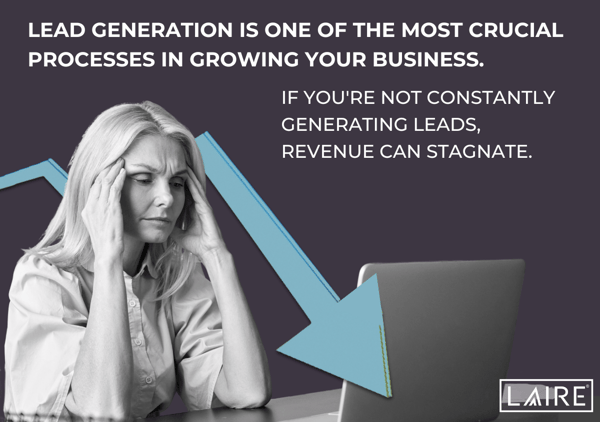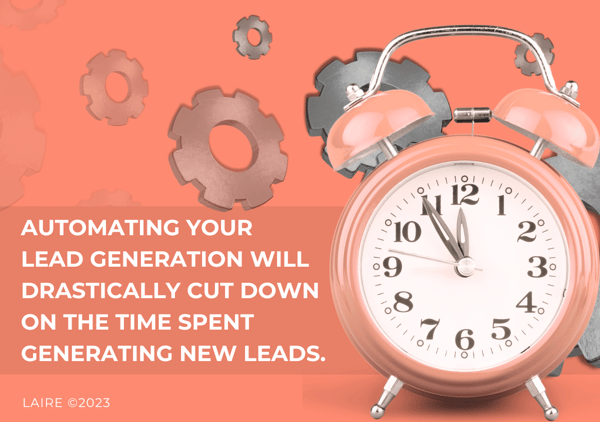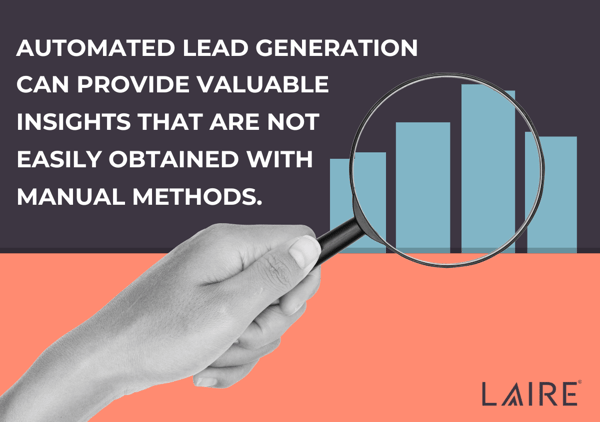Automating your marketing, sales, and service efforts has numerous benefits. Leads are regularly generated and nurtured, and more traffic is generated for your website, social pages, and overall online presence.
By utilizing tools and platforms that automate marketing campaign execution, social media posts, email follow-up, lead assignment, and other tasks that require scheduling or customization, businesses like yours can deliver a better customer experience, generate more leads, and achieve sustainable growth.
What Is Sales and Marketing Automation?
Automation in sales and marketing refers to the use of software and technology to streamline and automate various tasks and processes within the sales and marketing functions of your business.
The primary goal of automation is to improve efficiency, increase productivity, and enhance overall performance, ultimately leading to better customer engagement, higher conversion rates, and increased revenue.
With sales and marketing automation, your business can achieve better alignment between the two departments, fostering a seamless flow of data and communication. This collaboration enables the identification of more qualified leads and helps marketers understand the sales pipeline's performance, allowing for data-driven decisions and continuous improvement.
Examples of Automation in Sales and Marketing
Some types of marketing and sales automation are incredibly simple, such as creating blog posts and social media content in advance and then scheduling them instead of posting in real-time.
Other sales and marketing automation tools are more robust and meant to engage with thousands or millions of potential customers on multiple platforms, or route leads through a series of automations to get them into the right communication segments.
In the context of sales, automation tools can handle repetitive and time-consuming tasks such as lead generation, lead scoring, lead nurturing, and follow-up communications. These tools help sales teams prioritize leads, track customer interactions, and automate personalized responses, ensuring that reps can focus on building relationships and closing deals.
For marketing, automation encompasses a wide range of activities, including:
- Email marketing
- Social media management
- Content distribution
- Lead capturing
- Customer segmentation
Marketing automation platforms enable marketers to create and execute targeted campaigns, track user behavior, and deliver personalized content at scale. This helps them optimize their efforts, nurture leads, and convert prospects into customers more effectively.
What About Service Enablement Automation?
Automation in customer service, also known as service enablement, refers to the use of technology and software to streamline and optimize various aspects of the customer service process. It involves automating repetitive tasks, improving response times, and enhancing overall customer support efficiency.
The primary goal is to deliver a seamless and satisfying customer experience while freeing up customer service agents to focus on more complex and value-added interactions.
All in all, no matter your industry or firm size, automation provides numerous benefits in growing your business and honing your lead generation strategy so that leads can be properly nurtured. Here's how.
11 Key Benefits of Sales and Marketing Automation
Lead generation is one of the most crucial processes in growing your business. If you're not constantly generating leads, revenue can stagnate. 
It can sound daunting on top of all the other aspects of running a company. But the good news is that this task can be automated. In fact, it should be automated.
Here's why integrating marketing and sales automation in your lead generation process is one of the best uses of your resources.
1. Makes Lead Generation Less Time-Consuming
It's estimated that businesses spent $4.6 billion on lead generation through ads in 2021. Advertising, live events, social media, and other avenues for lead generation can quickly add up not just in marketing spend but in the time spent on building trust, online presence, and the brand overall.
Automating lead generation efforts like social campaigns, ads, and email processes drastically cuts down on the time spent generating new leads. 
By increasing your online presence and further fleshing it out with automated administrative tasks for your marketing, sales, and service teams, customer processes come to you with a "set it and forget it" mechanic, saving countless hours that would be otherwise spent performing these actions manually.
2. Facilitates Consistent Lead Nurturing
Once a lead has been generated, it needs to be nurtured into becoming a paying customer or client throughout its relationship with your organization. When hundreds of thousands or millions of leads are generated, it's simply impossible to manually follow up with each of them. Not all of them will become paying customers either.
Automating the lead nurturing process on various platforms, such as automatically emailing them relevant content or liking social media posts when your brand is mentioned, hastens the sales cycle and increases your overall digital presence. By reducing the time spent on these administrative tasks, your team can focus more on value-added, human interactions.
3. Helps Eliminate Repetitive Tasks
There are several marketing and sales tasks that still require a human touch.
You hired intelligent, competent professionals who know how to take full advantage of tools, platforms, and resources. They are needed in more strategic roles that require an expert to take a hands-on approach, rather than the tedium of following up with every single email, social post, and other digital marketing components.
By having automated workflows in place that keep leads engaged, it can stay hands-off while the staff directs their focus to tasks that need them to be more involved in real-time. For example, automation can help reduce the administrative burden for sales and service teams so reps can spend more time talking to customers.
4. Provides Data That Is Difficult to Fetch Manually
Lead generation isn't just about collecting email addresses or seeing who signs up for the free version of your website or product after clicking on an ad. Those leads contain valuable data that can be used to correctly and quickly nurture them.
Manually generating leads is better than nothing, but automated lead generation can provide valuable insights that are scalable and not easily obtained with manual methods. This includes whether they clicked on links in your content or not — as well as other activities if a tracking cookie has been attached. 
When you have an idea of what leads are doing, you start to notice trends like links or pages they gravitate to or avoid. This data helps you see what you're doing right and where there’s room for improvement so your teams can create even more effective lead generation websites and content.
5. Improves Sales and Marketing Alignment
Aligning your sales and marketing teams can be challenging. Their functions are incredibly different, yet they also have similarities and need to work together to achieve the same goals.
Marketing and sales automation tools make both departments' jobs easier, particularly when it comes to farming out the grunt work to an automation platform and focusing the teams on tasks that require a human touch.
Both departments have a common goal of lead generation, closing those leads, and getting them to become continually paying customers. But they can end up butting heads over content creation, marketing strategies, inbound marketing, and how to properly allocate their resources.
Automating lead generation puts both departments on the same page by giving them the same ability to easily obtain hundreds of thousands of leads and expedite the lead nurturing process.
6. Assists With Lead Segmentation
Lead segmentation helps with sales and marketing processes by breaking down leads into different groups so that content can be tailored to them.
For instance, a clothing company that caters to various audiences may want to segment its leads based on demographics, like age, or purpose, like ready-to-wear clothing versus occupational clothing.
Marketing automation smartly segments your leads for you. If someone clicks on the clothing company's ad for party dresses, they're clearly expressing a different interest than the lead who clicks on the ad with a picture of scrubs. It takes so much guesswork out of lead segmentation in comparison to manual methods.
7. Makes Personalization Faster, Easier, and More Effective
Automated lead generation can sync your organization's contact data for better personalization.
Personalized ads and email content lead to higher open rates and other signs of engagement.
When leads are addressed by their names, along with any other identifiers that they voluntarily provided, they feel a closer connection with the brand in comparison to being addressed with a catch-all like "Dear Business Owner."
Automated workflows have personalization options based on which fields require them and can be set up to also deliver personalized ads, content, and product recommendations based on prior engagement.
8. Enables You to Collect Leads Anytime
One of the strongest benefits of automated lead generation is that you can collect them all day long — long after everyone in the company has gone to sleep, no matter where they are in the world.
It doesn't have the same limitations as only being able to collect emails during business hours or at trade shows. There can be thousands of new leads that just show up at 3 AM on a weekend.
9. A/B Testing Maximizes Results
A/B testing simultaneously runs two different display ads or emails to the same group of leads or subscribers. They can be randomly selected by your marketing platform, or you can purposely segment them yourself.
By automating this process, you can get real-time insights into which type of campaigns resonate the most with your leads. Regular A/B testing helps you discern what emails are most likely to be opened and what types of content may get the most engagement. The process can also be completely automated, making lead nurturing simpler and speedier.
10. Expedites Nurturing Leads Into Customers
Ultimately, sales and marketing automation can dramatically shorten sales cycles and quickly get new leads to engage with your brand. Pushing leads through the sales funnel at a quicker rate than older marketing methods have typically allowed grants your teams more time to engage with qualified prospects.
Because the process is expedited, it becomes faster and easier to see who has more intent to convert into a paying customer and who shows little or no engagement. All around, this saves both departments a lot of time and eliminates the guesswork as to which prospects they need to follow up with.
11. Improves Lead Generation Efforts for Scalable Growth
Marketing and sales automation software plays a pivotal role in scaling lead generation efforts by streamlining and optimizing the entire lead generation process. With automation, businesses can efficiently capture leads from various channels, such as website forms, social media campaigns, and landing pages, and automatically add them to a centralized database.
These platforms enable lead scoring and segmentation, helping prioritize high-quality prospects and tailor personalized marketing messages. Automated email marketing campaigns can be set up to nurture leads through the sales funnel, ensuring consistent engagement and timely follow-ups.
Then, by compiling and analyzing the data from your A/B tests, your sales and service teams can take best practices to create templates and sequences that can be implemented across the business as a whole. Remember: One rockstar salesperson can’t be scaled, but a well-thought-out sales sequence can be.
Use Sales and Marketing Automation to Level Up Your Inbound Strategy
Setting up and integrating your sales and marketing automation software for the first time can seem daunting. LAIRE is here to help you determine which automation stack is the best fit for your brand and which strategies can generate the responsive top-notch leads you're seeking.
As a HubSpot Solutions Partner and B2B marketing agency, we aim to deliver results for businesses in the B2B sphere and are dedicated to assisting you in maximizing the capabilities of HubSpot as part of your automation toolkit.
Our digital marketing experts are ready to answer your questions about lead generation and automating sales, marketing, and service processes. Contact us today to get a free 20-minute assessment of your current stack and marketing strategy.


